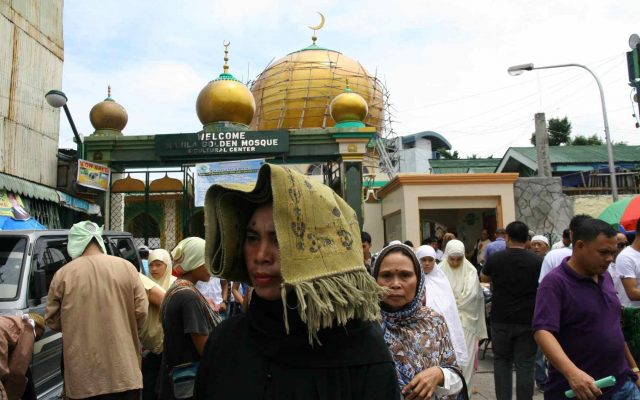
The Manila Golden Mosque in Quiapo.
“There are two kinds of Muslims, the Muslim who follows the religion and the Muslim who uses the religion.”
This is how Anzano Ibrahim Macalawig, 39, described his brethren as he spoke to InterAksyon after praying the “Asr” or afternoon prayer in a Masjid or mosque on Salas street in Ermita, Manila.
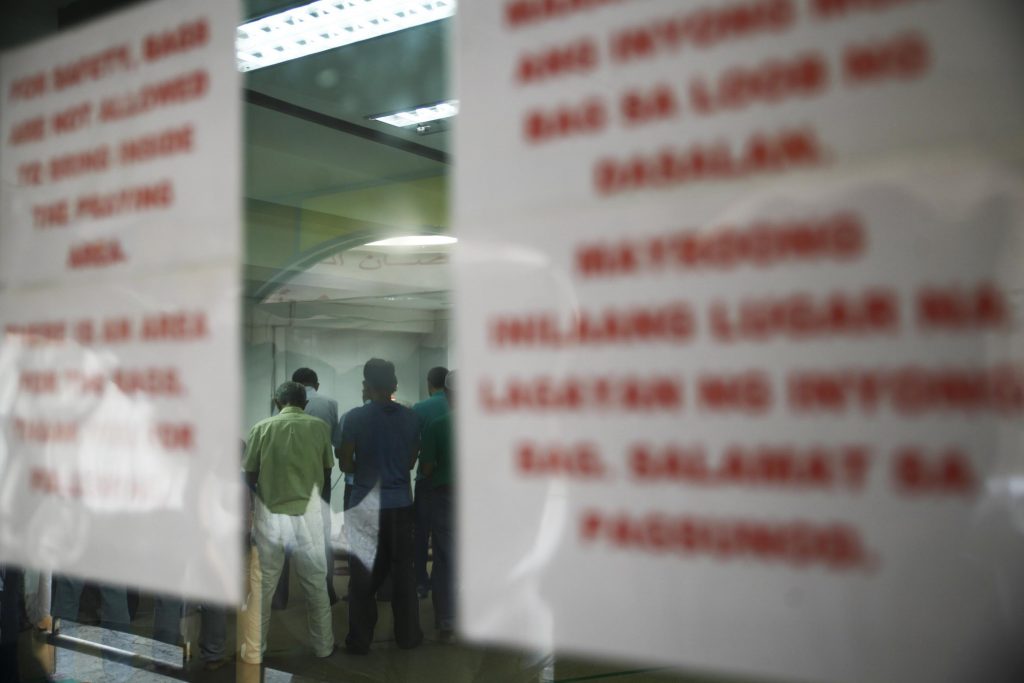
Filipinos and foreigners pray in a Masjid, or mosque, on Salas St. in Malate, Manila.
It was Thursday, a day before the fighting broke out in Marawi between government forces and extremist gunmen from the Maute and Abu Sayyaf groups, joined by a number of foreign fighters, marks its first month with no indication of when it will finally end.
The day hostilities began, President Rodrigo Duterte declared martial law over the whole of Mindanao.
While the bulk of Marawi’s 200,000 residents have fled, most of them now crammed into evacuation camps in nearby towns and urban centers, a number are believed still trapped in the Islamic city, large sections of which have been reduced to rubble by the fighting, which has been punctuated by air and artillery strikes.
The battle of Marawi has claimed more than 300 lives thus far, some 280 of these extremists, with the government losing 69 personnel, and more than 20 civilians, although fleeing residents have reported seeing scores of bodies as they escaped, indicating the final toll may be much higher. More than 400 government personnel have also been wounded.
Ibrahim works in Qatar and is the son of a diplomat from Marawi who has long been assigned to Middle East posts. He was only 5 when he left the country and first returned her when he was 12. Since then, “yearly na ang bakasyon namin (we vacation here yearly),” staying in their homes in Marawi and Cagayan de Oro City.
Although he has spent most of his life abroad, Ibrahim stresses, “Marawi is my home, diyan ako pinanganak (I was born there). As a Muslim, komportable ako dito at maganda ang weather (I am comfortable here and the weather is good).”
As fate would have it, he and his family were vacationing in Marawi when the trouble started but managed to slip through the checkpoints set up by the gunmen of the Maute group, reaching Cagayan de Oro after two hours. From there, they flew to Manila.
He acknowledged their good fortune, noting that it took some of their neighbors as long as 12 hours to reach Cagayan de Oro as they dodged the Maute Group’s checkpoints and crossfire.
Although safe now, Ibrahim says, “natakot kami, ngayon wala nang tao sa bahay namin (we are afraid, there is no one left at home).”
He laments that the Islam he knows has deep respect for people and other religions.
How then does he see the gunmen in Marawi? “Actually may respect for religion naman diyan noong araw pa, pero may mga dumadating na may utak na hindi maintindihan (Actually there used to be respect for religion before, but this has been tainted with the arrival of people with minds difficult to comprehend).”
Not a religion of death
“Kapag pumatay ka ng isang Muslim o Christian, parang pinatay mo na and buong mundo (When you kill a Muslim or a Christian, it is like you have killed the whole world),” Ustad Hajji Mohammad “Bebot” Ersad Malli, administrator of the Manila Golden Mosque, told InterAksyon.
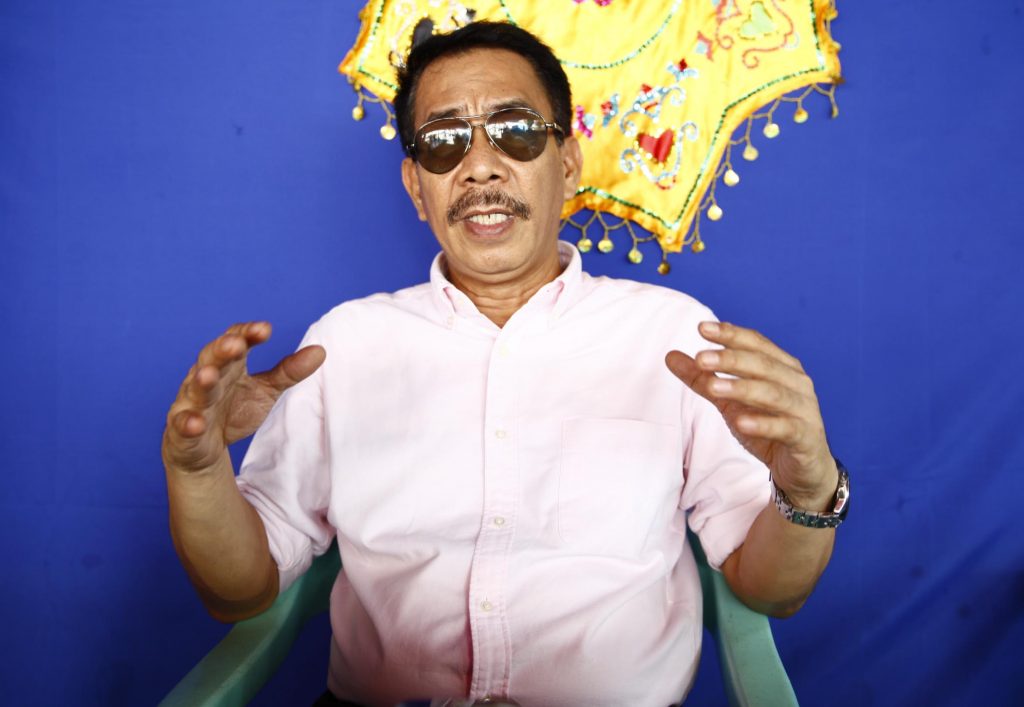
Manila Golden Mosque administrator Ustad Hajji Mohammad “Bebot” Ersad Malli
His religion, he stressed, is not a religion of death.
“Ang Islam ay ginawa at ibinilin kay Propeta Mohammad para tayong mga Muslim ay maging mabubuting tao (Islam came to be and was entrusted to the Prophet Muhammad so that we Muslims can become good persons. It is a religion of peace,” he said.
“Pero ang ginawa ng Maute, sumisigaw ang aming damdamin, lalo na malapit na ang Eid. Sana magka-ceasefire (But what the Maute did, our hearts are screaming in outrage, especially with the advent of Eid. We hope there will be a ceasefire),” he added.
Eid is Eid’l Fitr, or the “festival of the breaking of the fast,” which marks the end of the Islamic holy month of Ramadan.
“Walang panalo sa giyera (No one wins in war),” Malli said.
Then addressing himself to the extremists, he said: “Sa mga Maute, huwag kayo magpagamit, hindi ito religion of death, lahat dito ay talo (To the Maute, don’t allow yourselves to be used, this is not a religion of death, all of us lose with this).”
But he also noted “mahirap kalabanin ang mga taong ang tingin sa barrel ng baril ay Paraiso (it is difficult to fight people who see Paradise at the end of a gun barrel),” referring to the belief held by mujahideen of the heavenly rewards awaiting them if they die fighting for the faith.
Yet Malli is emphatic about his belief that the problem goes beyond religious extremism.
“Maraming sumasakay diyan — mga politikong desperado, drug lord — pera-pera lang din ‘yan, hindi puwedeng wala (Many are taking advantage of this — desperate politicans, drug lords — it’s also about money, it’s impossible there is none involved).”
He called on the government and the Maute to agree to a ceasefire and talk to resolve the conflict because aside from the growing death toll, including on the government side, and the rising cost of waging war, “maraming mga bata ang kawawa, ‘yung mga biyuda nila ang babata pa (many children are suffering, there widows are still very young).”
Malli himself is no stranger to the sufferings from war.
“Galing din kami sa giyera, noong burning of Jolo, tumakas kami damit lang ang dala namin (We also came from the war, the burning of Jolo, we escaped with only our clothes),” he said, referring to the burning of Jolo, Sulu during fighting between the Moro National Liberation Front and government forces in the seventies.
“Masakit ang maging biktima ng giyera, lahat po tayo apektado (It is painful to be a victim of war, all of us are affected),” he said. “Meron pang pag-asa, sa ngalan ng Islam, sa araw ng Eid’l Fitir, tigil putukan muna, mag-usap, itaguyod natin ang kapayapaan (There is still hope, in the name of Islam, on Eid’l Fitr, let there be a ceasefire, dialogue, let us promote peace).”
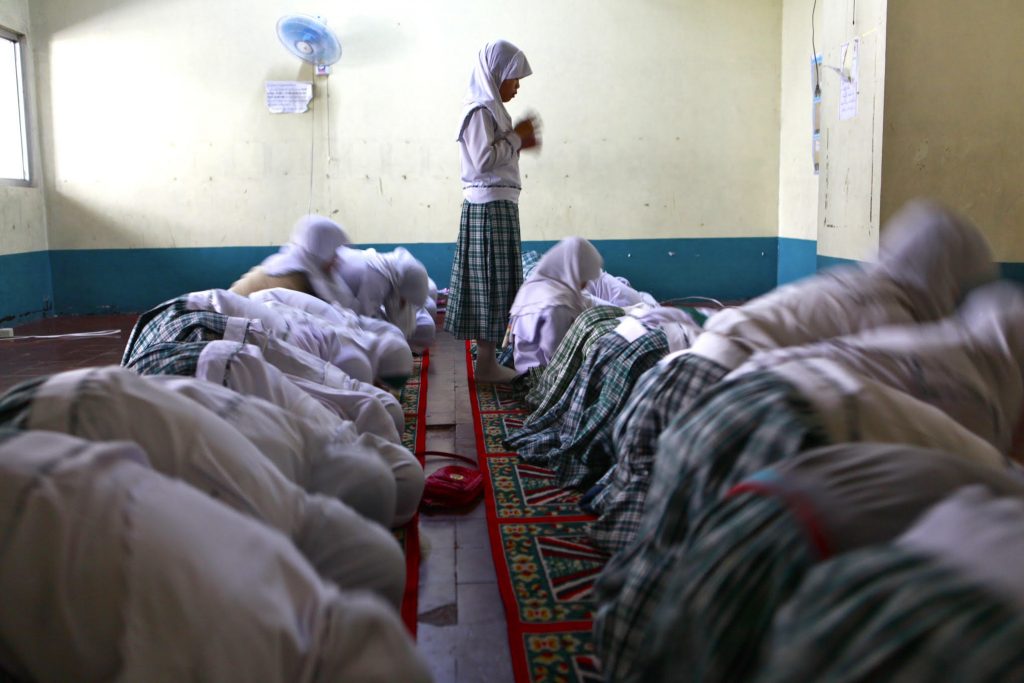
Students pray in Manila’s IQRA Kiddie Learning Center Inc. Integrated English and Arabic School.
Malli also said Duterte’s apology, albeit delayed, for what is happening in Marawi – the destruction of the beautiful city because of the fighting and air strikes – was welcome.
And while Duterte can be “very tactless pero dila lang ‘yun, naintindihan namin si Presidente (that’s his tongue, we understand the President).”
The way Malli sees it, Duterte’s hand was forced, “parang tinraydor, parang magulang ‘yan, iniwan mo ang bahay mo, pinasok ng magnanakaw, natural magagalit ka (it’s like he was betrayed, like a parent: you leave your house, thieves break in, of course you’d get mad).”
Papatayin ka nila
Rex Mao, 39, is from Marinaut in Marawi and has been living in Manila for the last 10 years selling DVD’s.
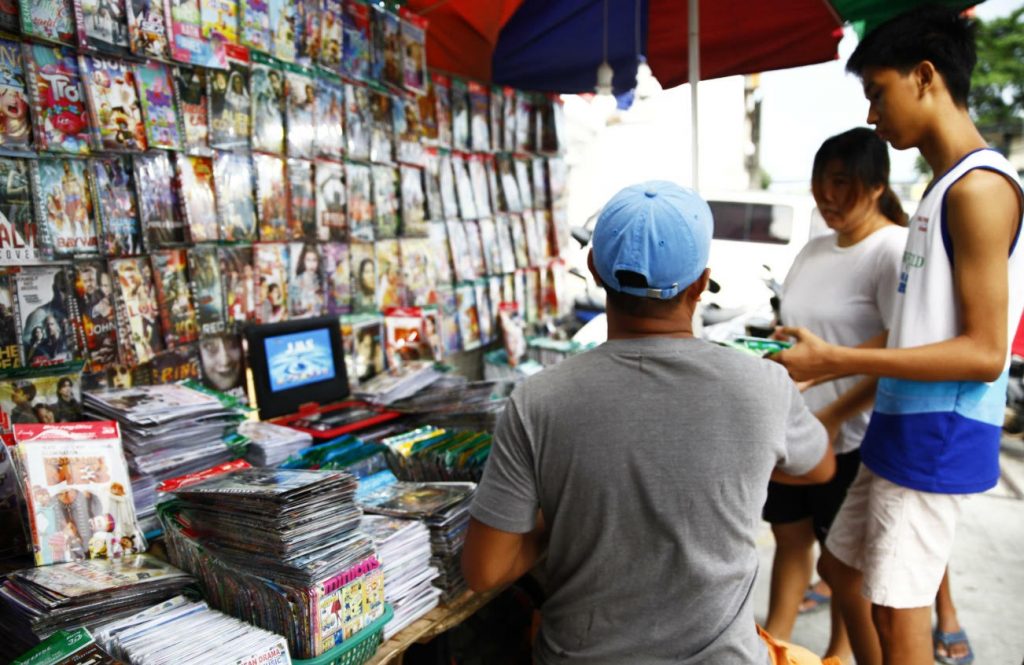
Rex Mao, 39, of Marinaut in Marawi sells DVDs.
His two older brothers, Bitoy and Tonton, who remained in Marawi, were trapped with their families for two weeks before finally managing to escape.
In a recent phone conversation with his brothers, he said he felt “awa at takot, syempre (pity and fear, of course)” and continues to worry for them because “walang mapagpadalhan ng pera kasi sarado ang mga padalahan (I cannot send them money because the remittance centers are closed).”
He does not hide his anger at the extremists.
“Masama ang loob ko dahil hindi na nila ginalang ang Ramadan (I am angry because they did not respect Ramadan),” Mao said. “Sabi ng kapatid ko, kapag hindi ka sumama, pagsasalitain ka ng salitang Muslim. Kapag hindi mo nabigkas ang Sura Al Fatiha, kailangan sumapi ka sa kanila. Kung hindi, papatayin ka nila, katulad ng ibinalita ng mga pulis. Kaya hindi sila lumabas, pasapiin sila (My brother said, if you didn’t join them, they would order you to speak Muslim verses. If you could not say the Sura Al Fatiha, you had to join them. If not, they would kill you, like what the police reported. That’s why they did not come out of hiding, because they would be forced to join).”
The Sura Al Fatiha is the first chapter of the Q’uran.
A neighbor of their family, said Mao, fled only after a bomb struck their house, killing one person.
Mao also admitted another brother was among the detainees of the Marawi city jail who were freed by the Maute group during the first week of the fighting. He said he has yet to get in touch with this brother and convince him to surrender.
The missionary’s wife
Fatima (not her real name), a native of Marantao, Lanao del Sur, sells socks, cellphone chargers, and bags in Cainta, Rizal.
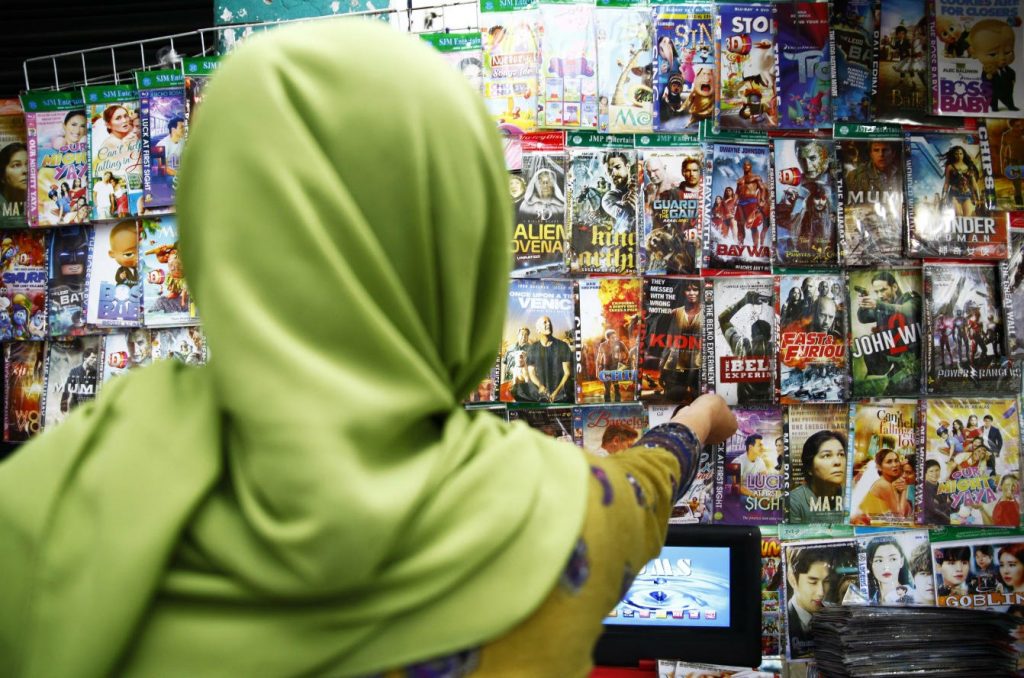
‘Fatima’ sells her wares in Cainta, Rizal.
Her husband is a missionary who attended a “johor,” a gathering of local and international Islamic missionaries convened in Marawi by the Tablighi Jamaat, a Sunni missionary movement, days before the attacks.
He left Cainta on May 15 and on May 20, he and 10 others were assigned to different mosques as part of the conference.
The missionaries, dressed in traditional clothes, chanced on a government checkpoint in Bumbaran town the day the fighting broke out, Fatima said.
“Napakagmalan silang mga (They were mistaken for) terrorists,” she said. “Ang ginawa nila, nang pinakamataas na Imam, pagkatapos magpakita ng mga ID, mga dokumento, dinala sila sa Wao. Sabi ng Imam, umuwi na kayo sa Manila (What they did, what their Imam did after they had shown their identification and other documents was take them to Wao (town). The Imam told them to go home to Manila).”
However, she said, it took them weeks to do so.
Her husband finally returned Wednesday last week. But most of her relatives remain in Marantao.
Fatima, too, is angry at the Maute group and their allies.
“Sino ang hindi magagalit? Kung talagang Muslim sila, hindi nila dapat ginawa ‘yan, kasi parang mahal na araw naming ‘yung Ramadan (Who would not get mad? If they were truly Muslim, they shouldn’t have done that because Ramadan is like our Holy Week),” she said.
“Hindi talaga maka-Muslim ang ginawa nila. Hindi naman sila ginugulo ng mga Christian (What they have done really does not benefit Muslims. The Christian have done nothing against them),” she added.
Now, Fatima worries that Muslims may feel the backlash of the extremists’ actions, citing allegations that the Maute group had been stockpiling their weapons and ammunition in mosques, which she fervently disputes, and worrying for her husband the missionary because of his preference for traditional clothes.

No comments:
Post a Comment
Note: Only a member of this blog may post a comment.